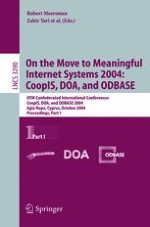2004 | OriginalPaper | Buchkapitel
FairNet – How to Counter Free Riding in Peer-to-Peer Data Structures
verfasst von : Erik Buchmann, Klemens Böhm
Erschienen in: On the Move to Meaningful Internet Systems 2004: CoopIS, DOA, and ODBASE
Verlag: Springer Berlin Heidelberg
Enthalten in: Professional Book Archive
Aktivieren Sie unsere intelligente Suche, um passende Fachinhalte oder Patente zu finden.
Wählen Sie Textabschnitte aus um mit Künstlicher Intelligenz passenden Patente zu finden. powered by
Markieren Sie Textabschnitte, um KI-gestützt weitere passende Inhalte zu finden. powered by
Content-Addressable Networks (CAN) manage huge sets of (key, value)-pairs and cope with very high workloads. They follow the peer-to-peer paradigm: They consist of nodes that are autonomous. This means that peers may be uncooperative, i.e., not carrying out their share of the work while trying to benefit from the network. This article deals with this kind of adverse behavior in CAN, e.g., not answering queries and not forwarding messages. It is challenging to design a forwarding protocol for large CAN of more than 100,000 nodes that bypasses and excludes uncooperative nodes. We have designed such a protocol, with the following characteristics: It establishes logical networks of peers within the CAN. Nodes give positive feedback on peers that have performed useful work. Feedback is distributed in a swarm-like fashion and expires after a certain period of time. In extreme situations, the CAN asks nodes to perform a proof of work. Results of experiments with 100,000 peers are positive: In particular, cooperative peers fare significantly better than uncooperative ones.
